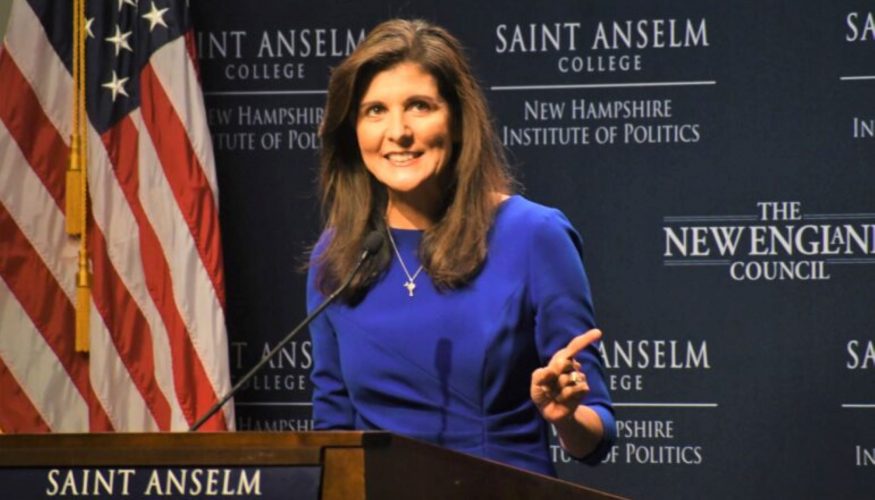Haley touts conservative pragmatism at Politics and Eggs

By Andrew Sylvia, Manchester Ink Link
GOFFSTOWN, NH – If Wednesday was any indication, New Hampshire can prepare for a lot of Nikki Haley over the next few months.
Former U.S. Ambassador to the United Nations and South Carolina Governor Nikki Haley spoke to the New England Council’s regular Politics and Eggs series at the New Hampshire Institute of Politics at Saint Anselm College, stating that she would not be outworked in the race for the Republican presidential nomination.
“If you join me in this fight, I promise our best days are coming,” she said.
During her speech and subsequent questions from the crowd of regional business leaders and local residents, Haley aimed to strike a balanced tone between conservative credentials and a pragmatic approach that can provide solutions in a hyper-partisan electorate.
This theme emanated throughout the event, one example coming on the issue of abortion where she sought to reframe the issue from discussion of how many weeks into a pregnancy abortion should be allowed. Instead, she felt that the issue would not be discussed at the federal level given the lack of any party to obtain 60 members of the U.S. Senate and instead felt it was best dealt with at the state level. She also said that while she is a pro-life candidate and would not change that viewpoint on the campaign trail, she also wishes to respect the viewpoints of pro-choice individuals and opposes imprisoning women who seek an abortion, and hopes to help increase access to contraception and increase instances of adoption.
On other domestic issues, she supports less partisanship in the judicial branch, supports the second amendment, increased investment and reform of the Veterans’ Administration and banning transgender women from women’s sports, calling that last point disrespectful to women and the largest women’s rights issue of the moment. She also supported school choice and reducing borrowing and clawing back money from COVID relief efforts like the Affordable Care Act.
Regarding immigration, Haley said that children of undocumented immigrants, also known as Dreamers, deserve to be taken out of legal limbo once the issue of the U.S. border is addressed and that immigration policy should be related to the needs of local businesses across the country.
She also said the lack of immigration reform helped Chinese-made chemicals across the border that are used to create fentanyl, a deadly opioid that is one of the largest killers of individuals in New Hampshire.
“Don’t think China doesn’t know exactly what they’re doing when they send it over,” said Haley.
Haley repeatedly attacked China and tied them to Russia, stating that although Ukraine should not receive direct funding from the United States, they need support in terms of ammunition and weapons. Haley described Ukraine as one of the biggest allies of the U.S. during her term at the United Nations and said the defense of their country was a war for freedom and that it is a war that Russia is currently losing. Haley also attacked China on the matter of intellectual property theft and strongarm tactics against corporations operating in China that puts the private data of U.S. citizens at risk.
Beyond China and Russia, Haley also noted that energy independence is a key part of national security and also criticized the U.S. pullout from Afghanistan, contrasting it with a message of strength that she believes she showed during her tenure as U.N. Ambassador.
Haley did not attack sitting U.S. President Joe Biden outside of a question regarding a statement she made about cognition tests for politicians over the age of 75. However, here, she said that statement was more out of concern than anything and said she would be willing to drop that age to 50, saying it was important given the serious issues that politicians in Washington deal with on a regular basis.
She also did not mention any of her rivals for the Republican nomination, instead focusing on her record of pragmatic approaches to address topics, most notably in 2015 during deliberations with the state legislature to remove the Confederate flag from the top of South Carolina’s State House.
Although the flag was eventually moved to a different part of the state house grounds, she hoped that this gesture would help eliminate instances she experienced growing up in South Carolina as a child of Indian immigrants.
This story capped the theme of pragmatic conservatism she says she got helping her family’s business and then refined as state legislator in South Carolina, eventually overcoming long odds in the polls to become governor in 2010.